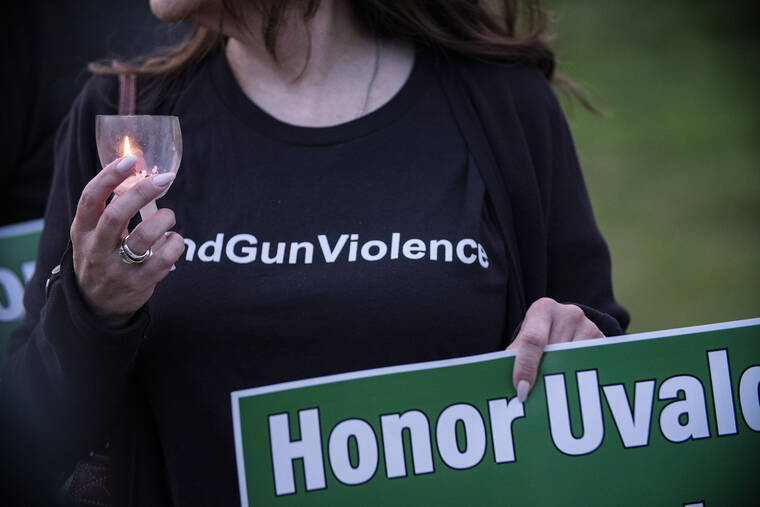People in the islands have felt some distance from the horrors of mass shootings in the past, even while acknowledging Hawaii’s own tragedy. In 1999, seven people were killed at the Xerox Corp. building in Honolulu, just months after the infamous Columbine High School massacre in Colorado had shocked the nation that same year. And as recently as Thursday night, residents got another reminder, through a three-victim shooting near the Neal Blaisdell Center, that the Aloha State is anything but immune to gun violence.
Still, Hawaii has strict gun regulations, with the addition in 2020 of a “red flag” law blocking firearms access to people showing signs they pose a danger to themselves or others. Such laws would impede access to the semiautomatic rifles as were used in the May 14 mass murder in Buffalo, N.Y., and in Tuesday’s rampage at Robb Elementary School in Uvalde, Texas. Dozens died, including 19 school children, in those combined tragedies.
Hawaii’s sense of insulation is no longer warranted. The gun-control legal landscape, here and nationally, may soon change.
The conservative U.S. Supreme Court is poised to rule on a legal challenge of a New York gun law requiring a special permit to carry a concealed weapon. However narrowly the justices rule, almost any change is likely to raise the temperature of the debate, in Hawaii and other states, over gun control.
So the terrors in faraway Uvalde and Buffalo are just as relevant here.
Following each of 21 previous mass shootings, the satirical publication The Onion famously has republished the bleak headline, “‘No Way To Prevent This,’ Says Only Nation Where This Regularly Happens.” Now all eyes are on Congress to see if this gloomy forecast is borne out, once again.
With demonstrators demanding action nationwide, a small bipartisan group is forming in the U.S. Senate to find common ground.
A decade earlier, the slaughter of Connecticut first-graders at Sandy Hook Elementary School had been seen as the last straw; that state passed a background-check statute. And gun violence was reduced in the following years, according to statistics.
But nationally? No agreement, not then, not after the 2018 mass shooting at Marjory Stoneman Douglas High School in Florida, not after other stunning killing sprees aimed at other venues. Racism has figured prominently in this mix of tragedies, including, most recently, the attack killing 10 that targeted a Black neighborhood supermarket in Buffalo.
Regardless of the reason for these shootings, the reaction to them was split sharply along America’s ever-widening cultural divide.
Opponents of gun control in Congress have been influenced over the years by the gun lobby, principally the National Rifle Association, meeting in a conference this weekend in Houston.
But America’s lock-and-load gun culture is firmly established across the conservative base, independently of the NRA. These are people who have been suspicious of any government intervention in what they see as their constitutional right to bear arms under the Second Amendment. That is why this side has balked at any legislative deal involving guns.
Proponents of gun regulation, though, have good reason to argue now that wide access to guns — and even the presence of armed police — have not protected innocent people.
What would protect them? Making the most dangerous weapons harder to get.
An outright federal ban of assault weapons was the law until it expired in 2004. Despite its loopholes, multiple studies showed mass-shooting deaths falling slightly in the decade following its enactment — and then rising significantly after it lapsed.
Its reenactment should be on the table. What plagues the country is the proliferation of such rapid-fire weapons of war that enable a shooter to kill with little interruption. Reducing that number through government buy-backs, leaving fewer to be stolen and then used in crimes, could prevent many deaths.
Accord on these points would be, in a manner of speaking, a long shot. But universal background checks are supported by a wide majority. A federal red-flag law could be among the hurdles placed before purchasers — especially those just reaching legal adulthood, and especially when seeking the more dangerous weapons.
National support for security measures and training at schools and other “soft” targets should be provided. Catherine Payne, Hawaii’s outgoing state school board chairwoman, last week noted that students here need more preparation for any copycat assaults that could occur in the coming months. On Friday, GOP state Sen. Kurt Fevella urged the addition of law-enforcement officers at public schools in the new school year.
Elevated school protocols and enhanced security training, at least, would be reasonable starts.
Critics of legislation like to say that at best, such laws may help only on the margins. The sad truth is that gun violence in America is in such a poisonous state that help on the margins is not a solution, but it’s a step this troubled nation needs to take.

